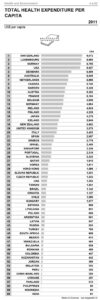
How important is healthcare to preserve competitiveness?
Moreover, what has been the impact of the financial crisis on the attention that governments have given to medical care to the population?
Since 2008, the average economy analyzed in the IMD World Competitiveness Yearbook has increased its total health expenditure per capita by 30%. This compares to an average GDP growth (not annualized) of 13.5% between 2008 and 2012. Generally speaking, in a period of crisis governments seem to prioritize healthcare. Of course the data hide significant differences among countries. Emerging economies such as China, Brazil, and Russia, all have seen increases in expenditure by more than 50%. In contrast, most European countries (and significantly among them, the U.K., France, and all peripheral countries in the Euroland) have witnessed mild, if not negative, changes in health expenditure. These are all countries where the starting levels of public expenditure are significantly higher. In the average economy, total healthcare expenditure was about $2,000 per capita in 2008; in Europe it was $3,000.
Where do we stand as we begin 2014? Our latest rankings show that countries that spend the most in healthcare are Switzerland ($9,072 per capita), Luxembourg ($8,900), Norway ($8,795), and the USA ($8,627). It does not necessarily follow that it is in these countries where healthcare is the best. Belgium ranks number one in the question “Health infrastructure meets the needs of society,” but it is only 12th in public healthcare expenditure. And while the USA is the fourth country by healthcare expenditure, it ranks 30th in health infrastructure.
The countries that spend the least in healthcare are: China Mainland, Ukraine, Thailand, Philippines, Indonesia, and India. What the data show are dramatic differences among countries. The highest spending economy in our rankings (Switzerland) spends 150 times more in healthcare than the lowest-ranked country (India). Italy (ranked 20th) spends almost four times as much as Poland (40th). Countries that spend the least in absolute terms also spend little relative to GDP. So it is not just that they are poor—they do not prioritize healthcare.
Our conclusion is that differences in health policies are creating a significant gap in competitiveness between rich and poor economies.

Research Information & Knowledge Hub for additional information on IMD publications
IMD produces a yearly Smart City Index offering a balanced focus on economic and technological aspects of smart cities on the one hand, and “humane dimensions” of smart cities (quality of life, environment, and inclusiveness) on the other. In this...

The European Commission is once again focused on boosting Europe’s competitiveness, this time by integrating the bloc’s capital markets. The EU executive published a range of measures on March 19, aimed at unlocking the €11.6 trillion ($12.8 trill...
We extend the mixed gamble perspective to explain how family-controlled firms frame and evaluate the difficult trade-off between potential gains and losses in financial wealth (FW) and socioemotional wealth (SEW) when pursuing portfolio-level stra...
Foreign firm access to the public procurement markets—valued at some $13 trillion worldwide—is not governed by standard trade policies and multilateral trade accords. In trade policy circles, failure to publish procurement tenders in a global lang...
With stagnant import volumes since 2021, and import prices at levels below those suggested by fundamentals, foreign exporters face an uphill battle to convert access to the Chinese market into revenues. Notably, the volume stagnation predates the ...
Published by International Institute for Management Development ©2025
Research Information & Knowledge Hub for additional information on IMD publications
Research Information & Knowledge Hub for additional information on IMD publications
IMD World Competitiveness Center Report, 8 April 2025
Research Information & Knowledge Hub for additional information on IMD publications
Research Information & Knowledge Hub for additional information on IMD publications
in Journal of Management Studies 20 March 2025, ePub before print, https://doi.org/10.1111/joms.13218
Research Information & Knowledge Hub for additional information on IMD publications
Research Information & Knowledge Hub for additional information on IMD publications
Research Information & Knowledge Hub for additional information on IMD publications
in The Quarterly Review of Economics and Finance January 2025, vol. 99, 101898, https://doi.org/10.1016/j.qref.2024.101898
Research Information & Knowledge Hub for additional information on IMD publications
Research Information & Knowledge Hub for additional information on IMD publications
Research Information & Knowledge Hub for additional information on IMD publications






